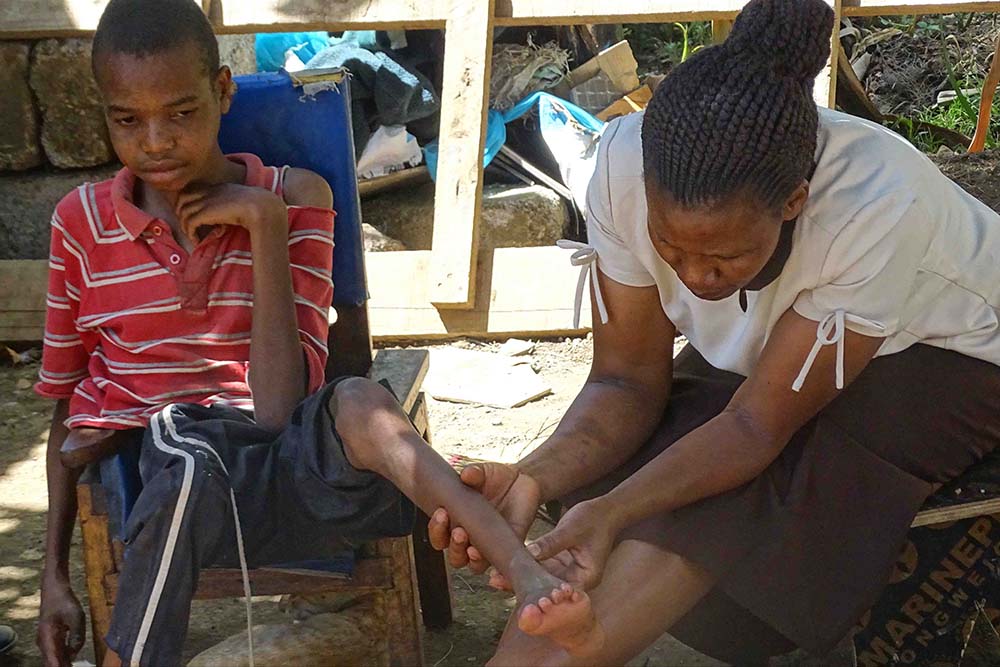Change children’s lives
Education is not only a fundamental human right but it is also inextricably linked to poverty. We work in underserved, often completely overlooked communities that other organizations miss. This means FAE can make a huge impact. FAE is  working with these communities and partners to keep children safe and support their wellbeing and development through increasing their access to quality disability inclusive education; quality healthcare and nutrition; safe water, hygiene and sanitation; women economic empowerment, ending child violence, and expanding awareness and advocacy.
working with these communities and partners to keep children safe and support their wellbeing and development through increasing their access to quality disability inclusive education; quality healthcare and nutrition; safe water, hygiene and sanitation; women economic empowerment, ending child violence, and expanding awareness and advocacy.
A situational analysis shows that child poverty is Tanzania’s greatest challenge. It destroys lives. We at FAE have made it our mission to fight child poverty through education with passion and professionalism. We are determined to tackle it, no matter its complexity. We believe that it is not inevitable and it can be overcome. Basing on population growth rate, the population of Tanzania is estimated at 57.5 million people whereby male (48.7%) and female (51.3%) by 2021. Children under age of 18 constitute 50.1% of entire population of whom male are 48.6% and female are 51.4%. Children and young people are the majority but face numerous challenges that effect their welfare and development.
The situation is even worse for children with SEND. For example, they are the majority among children out of school in Tanzania. These individuals are excluded because of poor education system and society support, and therefore denied their right to an education. They are the most vulnerable to violence, injury or abuse, neglect or negligent treatment and exploitation. Thus, they are barred from realizing their right to education and other rights making them the most likely of all population groups to be living in poverty today and in the future.
Why give special attention to children and young people with disabilities?
The International Education Commission estimates that globally there are close to 65 million primary and secondary school age children with disabilities. And that at least 32.5 million are out of school. The situation is extremely grim in the developing countries where up to 90% are out of school especially girls with disabilities. Many of them are orphans and live with a single parent and will probably never enter a classroom. By 2008, it was estimated that 80% of children with disabilities in Tanzania are out of school. Children with disabilities are the most likely of all population groups to be living in poverty today and in the future. Despite this, disability-inclusive education ranks low on government education prioriti es.
es.
Quite often, families having children with disabilities are also the poorest. In a struggle to meet the needs of a child with disabilities makes the families even poorer. Also, when balancing who take to school between healthy children and children with disabilities, most families choose to support the healthy children. So, exclusion and discrimination starts right at the family level and the children with disabilities lack capacity to demand for their rights, including right to education.
There have been many cases where children with disabilities have been locked indoors and denied education and even food putting their survival right at risk. Moreover, the world cannot achieve the Sustainable Development Goal (SDG) 4 on education by 2030 if children with disabilities continue to be left behind in education. The SDG 4 calls for inclusion and equity in education as the foundation for quality education.
Our Vision for the next 5 Years:-
- Enabling over 20000 children study in disability inclusive schools.
- Providing nutritious school meals and healthcare access to over 20000 children.
- Ensure 20000 children have access to safe water, sanitation and hygiene services.
- Establishment of a model/demonstration disability inclusive primary school.
- Capacity building for 150 teachers and 140 teacher aides on disability inclusive education.
- Transforming learning infrastructure of 10 schools to become disability accessible.
- Changing negative attitudes and practices of at least 250000 people towards children with disabilities.
Help us reach our goal, get involved
Would you like to be involved? Learn more on what you can do here or contact us now to discuss how you can be involved in the FAE’s activities!

